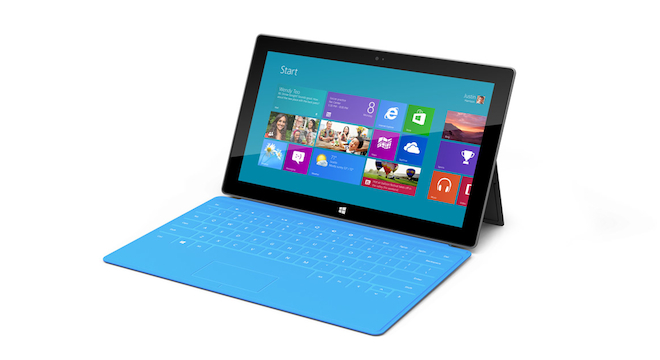Microsoft turned heads around the tech blogosphere and the world on Monday by unveiling its first-ever in-house tablet computer, the Microsoft Surface, at a much-hyped press event in Los Angeles.
But the ambitious tablet — or tablets, as Microsoft actually demonstrated both a standard and “Pro” version of Surface — will be just part of a fleet of mobile devices running Microsoft’s new Windows 8 operating system that consumers will be confronted with later this year.
That being the case, can it, or any of them, succeed at taking market share from Apple and Google?
“This is just another Windows 8 product in the marketplace,” said Ross Rubin, an analyst with market research firm NPD Connected Intelligence and a columnist at Engadget, in a telephone interview with TPM. “It’s just another competitor [for other device manufacturers] to deal with.”
Microsoft’s move to reveal Surface has been widely interpreted as something of an affront to the company’s current business partners, major PC and tablet manufacturers including HP, Dell, Asus, Acer, Lenovo and Toshiba, all of which previously revealed or were reported to be working on Windows 8 devices for release later this year, when the full public version of the operating version ships, reportedly in October.
Some of the executives at these Microsoft partner companies, commonly referred to as “original equipment manufacturers,” or OEMS, complained to Reuters late Tuesday that they were given little-to-no advance warning of Microsoft’s decision to produce its own hardware, a clear break from the company’s 37-year-history of focusing mainly on software and peripherals, like computer mice and keyboards (with the Xbox being a notable exception).
Yet publicly, those same manufacturers and Microsoft partners, many of whom deal primarily in Windows-powered machines, have put on a brave face, suggesting as Rubin does that Microsoft’s entry into the increasingly hotly-contested mobile hardware space doesn’t change the industry, or their plans, that much.
A spokesperson for HP, the world’s largest PC manufacturer, declined to comment to TPM about Surface specifically, but said that “we haven’t announced specifics about our Window 8 tablet plans (other than to say we will participate in that business).” A leaked slideshow that was posted online in May indicated that HP was pursuing a Windows 8-powered tablet.
A spokesperson for Asus, a Taiwanese-based computer manufacturer that in early June demonstrated a robust lineup of Windows 8 PCs, tablets and “in-between” devices it calls transformers, told TPM: “Thanks for checking with us but we are not commenting on Microsoft’s conference… nor on our future x86 tablet plans.”
Rubin told TPM he expected that Microsoft’s debut of Surface would “raise issues” between the company and its OEM partners, “it doesn’t have to be a major point of contention,” pointing out that Microsoft could be pursuing a similar strategy as Google, which only produces one line of hardware devices so far, Nexus, which it has thus far developed with several different hardware partners.
At the same time, Google licenses Android as an open-source operating system for smartphones created by other companies including HTC and LG. Microsoft, it should be noted, has not announced nor is it expected to license Windows 8 as an open-source project, but rather as a closed-source system that can’t be radically modified, though open-source apps from third party developers will be allowed.
“We continue to see more companies look at vertical integration — or how to mix a licensing model with their own hardware development,” Rubin said, “In the past it’s been very hard to make it work.”
Still, Rubin said that the bottom line for consumers looking to make a tablet purchase this fall would be a making a choice not between Microsoft Surface and other Windows 8 tablets or PC/tablet hybrids made by other companies, but between Windows 8 tablets, Android tablets (Google is reportedly working on its own branded Android tablet for release soon), and the reigning market champ, the Apple iPad.
“The competition will be where the competition is today,” Rubin explained, “It’s not really between Windows OEMs or them versus Microsoft, but between Microsoft and Apple.”
In that sense, at least Microsoft’s hopes to compete with Apple rest not on any one single hardware device, no matter how much its sunk into developing Surface, but rather on how consumers broadly take to Windows 8, a radical redesign of Windows that does away with the familiar desktop, taskbar and file-folder system that Microsoft made ubiquitous and that made the company the largest PC software manufacturer in the world, replacing it with a series of interlocking, multicolored square “tiles” that Microsoft calls its “Metro” user interface, an interace designed to be used as easily on touchscreens as it is with a keyboard and mouse.
Microsoft has not published any pricing or release date information for Microsoft Surface, except to say that it will be “competitively priced.”
Correction: This post originally incorrectly identified Ross Rubin’s company as “the NBD Group,” when it fact it is specifically “NPD Connected Intelligence.” We have since corrected the error in copy and regret it.






